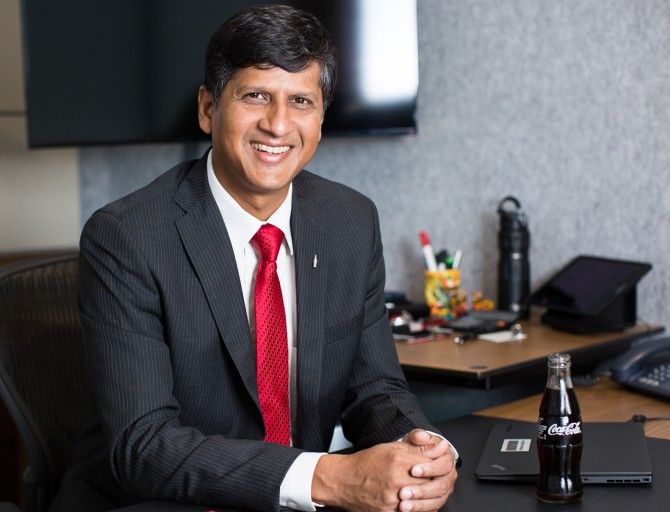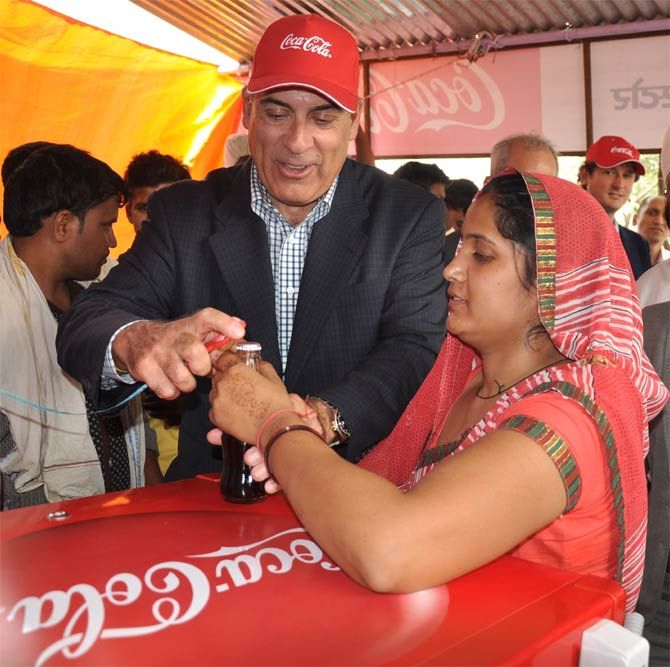‘It’s up to the consumers what they want to drink.’
‘We want to be absolutely transparent about calorie contents in our product.’

The country’s largest beverages maker Coca-Cola’s sales and profits were under pressure in the last financial year.
While the multinational firm has been a key player in the fizzy drinks category, it is now looking to aggressively promote juicy drinks with pulp.
Venkatesh Kini, business unit president, Coca-Cola India and South West, shares his plans with Arnab Dutta in a candid chat.
Are juices and non-fizzy drinks Coca-Cola’s new-found focus?
We are working on launching juice-based fizzy drinks in India and are in talks with the government on setting up standards for such products.
We hope that over the next few months we will be able to expand the range of sparkling beverages that contain juices.
Adding juices to our existing carbonated beverages is the current focus area.
Coming up with a completely new product on that front is less attractive, as it takes more time. So, we are working on options.
We will accelerate product launches in next three years.
We are focused on launching new flavours with pulps under Minute Maid and expanding the product range under Vio, which is a milk-based drinks brand.
Globally, Fanta comes in various fruit flavours. We launched Fanta Green Mango some time ago. We learned about what consumers here are looking for and went back to the drawing board.
Your competitor PepsiCo has been very vocal about healthier drinks that contain lesser sugar and are non-carbonated. Why is Coca-Cola less aggressive on that front?
I would ask people to watch our actions and not the words. We wanted to first streamline the portfolio and then get vocal about it.
So, as the portfolio is in place now, we have started taking about it.
World over and in India, we are leaders in every product category.
I would also argue that nothing that we sell is unhealthy. Whatever we sell has purpose.
We offer a wide-range of products, including nutritious, sugary, non-sugary, fizzy and non-carbonated drinks. It’s up to the consumers what they want to drink.
How does Coke plan to leverage increasing awareness about consuming less sugar?
We want to be absolutely transparent about calorie contents in our product. We have started mentioning them in bold on our packs, so that consumers can themselves decide what and how much they want to consume.
We wanted to go a step further.
So, we have proposed, and are in conversation with the Food Safety and Standards Authority of India, that there should be standardised labelling practice across all food and beverage categories, which will showcase the calorie counts from sugar, fats, etc, and the extent of salt and other ingredients used in the products.
It should be depicted prominently in red, yellow, and green colour coding -- indicating whether the products are high, balanced or low, respectively, in those ingredients.
Today, the carbonated drinks industry barely consumes only 2-2.5 per cent of the total sugar consumed in the country. But there is a false perception that carbonated drinks are rich in sugar and are unhealthy.
We want people to be informed.
The advantage that beverages have compared to most food products is we can offer products with very less sugar without affecting the taste.

Coca-Cola’s volume sales were hit during the peak summer months, profits declined, and revenue is under pressure. Why?
Tax on carbonated beverages has grown dramatically in the last two-three years, which, consequently, forced us to hike prices. The industry has been hit by this.
Once the goods and services tax kicks in, I think it will help us.
Also, consumption slowdown in the fast moving consumer goods sector has hurt impulse categories like beverages.
How is Coke preparing for the goods and services tax?
We have merged the two teams which used to manage the company-operated bottler and franchise-operated bottlers to streamline our operations.
Operations in India are now overseen by one senior vice-president, and the rest of the South East Asia is looked after by another VP. So, now we will take up programmes for the whole country supported by a national supply chain.
GST will allow the simplification of supply chain, distribution and consumer promotion.
The biggest advantage of GST will be that it will help us cut down the cost of distribution -- from factory to the consumer. It will also reduce inefficiencies in manufacturing and distribution.
Are you also planning to reduce the number of factories and warehouses?
The number of warehouses will definitely come down.
But the beverages companies will continue to maintain manufacturing units which are spread across the country, unlike other FMCG firms.
First of all, our cost of transportation overtakes the cost of production beyond a certain distance, as the products are bulky in nature.
Secondly, factories usually get exhausted in meeting the demand of population residing 300 kilometres of radius around them.











